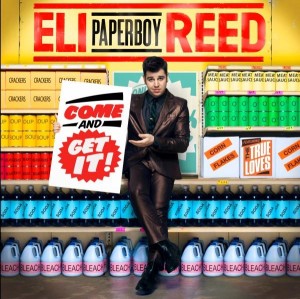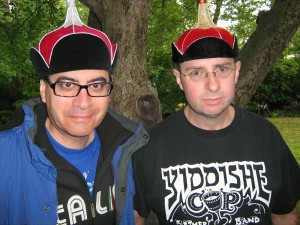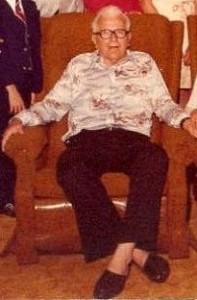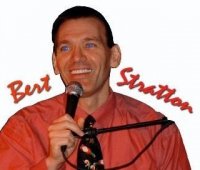Posts from — August 2010
TED “SKI”
Ted Budzowski was my dad’s favorite building manager. Maybe because they were both Teds.
My dad was “Ted” at work and “Toby” at home. Ted Budzowski was “Ski” at his day job (crane operator at Republic Steel) and “Ted” around the building.
Ted Budzowski could have treated me like a silver-spoon son of a boss, but instead he invited me down to the mill on family day. I didn’t make it to the mill for some reason. Everything was air-conditioned at the mill now, Ted said, including his crane cab.
I eventually caught a tour of the mill with the Society for Industrial Archeology. The slabs of molten steel coming from the furnace looked like creamsicles. Big red melting blocks.
My dad and Ted talked in a clipped cadence, like telegrams. Ted would say, “The kid [tenant] is hanging on by the grace of God.” That meant pay up.
“That tenant is a troublemaker,” my dad answered.
“The kid better not raise a rumpus.”
“He’s thinks he’s cute.” Toby said.
“Yeah, tell it to the judge,” Ted said.
“Give him an eviction notice.”
Ted had two Stratoloungers in his living room, an Okinawan mongoose-and- cobra souvenir, and a tree-stump occasional table, which his son had made. The son lost $8,000 on tree stump tables, which never caught on big in Cleveland. The good news was the son also was a retired career solider.
Toby and Ted were about the same age. Toby was from Kinsman Road, and Ted had grown up in Youngstown, Ohio, near Cowshit Hill (a real place). Ted’s kids had made it out, just like Toby’s. Ted’s second son worked for the phone company.
When Ted retired to Texas to live near his military son, I hired Buck, a hard case who had grown up in a Tennessee orphanage. Buck didn’t like certain people, particularly sons of bosses. Buck thought many routine tasks — cleaning up after tradesmen, watering outdoor plants — were not part of the job.
Buck frequently got “porky” with me. (That was West Side talk for “argumentative.”) Ted, on the other hand, had always been helpful. Ted would tell me when my tire pressure was low. He could sense low tire pressure. He thought about tire pressure.
For his last 15 years, Ted’s HQ was probably his Stratolounger in San Antonio. He didn’t check back with me, except for an annual holiday card.
Meanwhile, Buck was raising prices unilaterally on odd jobs. He never asked what I thought the job was worth. Who was bossing whom?
I had a hard time bossing around people older than myself.
That changed. I got older.
—-
1 of 2 posts for 8/25/10. Please see the post below too.
August 25, 2010 4 Comments
GOOGLEGÄNGER
Bert Stratton is a pianist and singer on the Caribbean Princess cruise ship.
A man phoned and said, “Bert, this is Joe. I’m upstairs.”
I was in the basement. Joe was upstairs. Creepy.
Joe was upstairs at the other Bert Stratton’s house.
A friend of mine saw Bert perform. Bert knew me — knew of me — he told my friend.
I know Bert, sort of. The imposter always tops me on Google.
I wouldn’t mind playing a cruise ship like Bert Stratton. I know a retired rabbi — Bernard Ducoff, the father of Yiddishe Cup’s dance leader Daniel Ducoff — who does cruise ship gigs. He’s the boat rabbi for a week or so. Yiddishe Cup could do a Caribbean klezmer cruise. There already is a Caribbean cantors cruise on Kosherica lines. (Not fiction.)
I could not see doing a klezmer bus tour. No thanks to blowing clarinet on a moving vehicle. Bad for the teeth. I was asked to play on Lolly the Trolley and said no.
I could play klezmer on an elevator. I did. Yiddishe Cup played elevator music at the opening of Stone Garden Center for Adult Living. We have played at Stone Garden many times since, but not in the elevator. We call our Stone Garden gigs “playing the Garden,” as in Madison Square Garden.
Has Bert Stratton ever played the Garden?
—-
2 of 2 posts for 8/25/10
August 25, 2010 2 Comments
WILY WEATHER
1. A HARD RAIN’S A-GONNA MAYBE FALL
Yiddishe Cup’s keyboard player doesn’t like to play in direct sunlight. He wants our contract to say “We will not play in direct sunlight.”
I ignore him. At summer concerts, I try to set up outside. This has cost the band one loudspeaker, damaged by heavy rain.
Yiddishe Cup has played on the Wiley Middle School lawn, University Heights, Ohio, for 16 years and has moved inside the school three times. (Thus, there is a 19 percent chance we’ll get rained out in Cleveland on an August night.)
At private parties, clients sometimes rent backyard tents just so they can have something extra thing to worry about — whether the tent will blow down or not. Some Jews will pay extra for another worry.
Yiddishe Cup played a tent in Dayton, Ohio, where it rained so hard, busboys poked holes in the canopy to collect rain into garbage cans. I thought the band might get electrocuted, the floor was so damp.
At a Shaker Heights tent, the air was so hot and humid, my clarinet slid apart at the cork joints. Biloxi, Miss., had nothing on Shaker that night.
Yiddishe Cup played poolside in a Shaker backyard. We were like Catskill mambo kings. At the Akron (Ohio) JCC, we also played poolside, and the kids tried to splash us with belly slams and cannonballs. That was Family Fun Day, a.k.a. Let’s Destroy Professional Musical Instruments Day.
Yiddishe Cup’s keyboard player doesn’t like it when I vacillate between indoors and outdoors. Mr. Keyboard Player, who are you going to trust, AccuWeather or your leader?
I avoid indoors if possible. Granted, outdoor sound is mediocre, but the breeze is good and the kids get to run on the grass, and summer is so brief.
Last summer at University Heights, we moved the band’s equipment indoors at the last minute. The storm knocked down a chain-link fence and several trees. That was one of my better calls.
—-
Here’s a video clip from last year’s concert. (The stage patter at the end of the song, at 1:58 min., is amusing.)
***
2. ELI, ELI
Eli “Paperboy” Reed played at University Heights with Yiddishe Cup the night the power went out throughout Ohio, then Michigan, Ontario, and the entire Northeast. Maybe Eli caused the Northeast Blackout of August 2003. Eli, not FirstEnergy. We continued the concert with a battery-powered amp.
Eli “Paperboy” Reed doesn’t need, or probably want, a middle-aged klezmer guy saying nice things about his new album, Come and Get It. (Klezmer Old Dude = Kiss of Death.) I’ll keep it low-key. Ta-da . . .

Eli “Paperboy” Reed sings and writes original, yet classic-sounding, R&B/soul. No, “Eli ‘Paperboy’ Reed” is not a pseudonym for my son the drummer. My son-the-drummer’s pseudonym is DJ Paradiddle.
Reed, 26, is big in Europe. Like on The Ed Sullivan Show (the modern-day Brit equivalent) and the cover of Rolling Stone (the Brit equivalent). Look for Come and Get It on Capitol Records and for Eli everywhere. He was on NPR “Weekend Edition” [hear] several days ago. He’ll probably be on late-night American TV soon.
I know a couple klezmer guys who are big, too, who played with Yiddishe Cup. Years ago the bass player for the Klezmatics did a gig with us in Toledo.
Ipso facto, there is no such thing as “big” in klezmer.
Eli Reed doesn’t play klezmer, though. When he performed with Yiddishe Cup, he did soul/R&B.
Reed and his band, the True Loves, have a gutsy Stax-like sound, which provides the core support to Reed’s emotive lyrics, which are rabbit punches to the solar plexus of young love. Example: “You went from name calling to calling my name. You went from school-yard teasing to all night pleasing.” That is clear-cut sawing in the coming-of-age forest.
Eli — they love him in España and France. I hope Eli “Paperboy” Reed becomes huge in America, and says in passing, “Yiddishe Cup is all right,” and Yiddishe Cup gets more gigs.
When you buy Eli “Paperboy” Reed’s Come and Get It, tell them — Reed, Capitol, iTunes, et al. — Yiddishe Cup sent you.
—-
1 of 2 posts for 8/18/10. Please see the post below too.
—-
See Yiddishe Cup 7 p.m. tomorrow (Thurs. Aug. 19) at Wiley Middle School, 2155 Miramar Blvd., University Hts., Ohio. Free. Indoors if raining.
August 18, 2010 2 Comments
FINE POINTS
Magic Markers must say “Sharpie Retractable Fine Point.” The “Retractable” means there is no cap — nothing to unscrew and then laboriously screw onto the other end of the pen.
I ordered 24 red Sharpie retractables online because I couldn’t find a lone red Sharpie at Staples or Office Max. Those places think you’re representing the entire Cuyahoga County juvenile court system when you walk in.
Pay close attention to the words “fine point” on the retractable Sharpie. The “ultra fine point” model is nothing more than a pen.
I bought 7 pounds of 7-inch “Big Red” rubber bands from Netherland Rubber in Cincinnati. The company wouldn’t sell less than 7 pounds. That supply — my 7 pounds/1,260 rubber bands — lasted eight years. If you purchase similar big rubber bands at Discount Drug Mart or Staples, you’ll pay $2 for 12 rubber bands — 17 cents per rubber band. Mine, in bulk, were 3 cents. The rubber bands are good for organizing manila-folder tax return files. They’re also useful for organizing clothes in a duffel or backpack.
Pentel RSVP pens . . . You need a balanced pen like that. Use the RSVP fine point for detail work like bookkeeping, and the medium point for regular tasks. The medium point moves quicker across the page than the fine point. Use Gel pens for the dramatic, inky, John Hancock-style, five-year lease signing.
For Post-its, pay extra and go Super Sticky. Make sure you don’t accidentally buy the accordion-style, pop-up Post-its. That is a death sentence.
I wrote to a real estate newsletter: “The Post-it has simplified my life more than my computer!” This was pre-Internet. Now I’d take my computer over Post-its to a desert island.
Get a couple clip-on pens. Don’t buy them. Find somebody from the Cleveland Clinic to give you a couple. You need a clip-on pen (no cap) for quick accessibility. Sometimes a bandleader has to quickly write the name of a tune on an index card. Nobody can hear anything on stage.
My father used 8-column green accounting pads for record keeping. I still occasionally refer to his records, particularly the marginalia, like “Light the incinerator from the top floor down, so the refuse burns down.”
Incinerators were banned more than 40 years ago.
“In September have boilers bled and check safety valves.”
Check.
For checks, try J&R Computer Supply in Mankato, Minnesota . . .
—-
2 of 2 posts for 8/18/10
August 18, 2010 No Comments
KLEZKLEVELAND
The last Midwest klezmer conference was in Chicago in 1998. The Challah Fame in Cleveland wants to restart the Midwest klez conference. Not in Chicago, thank you. And not in some bubble-tea town like Madison, Wisc., either.
KlezKleveland. Check it out. This year. Or maybe in 2018. (To be announced.)
KlezKleveland will be like KlezKamp and KlezKanada, but with more letters and more heymish — with a Midwestern “hi!” attitude.
Where: my house.
Accommodations: tent camping on my neighbor’s front lawn. Or you can camp inside his house. There’s no plumbing; his copper pipes are gone. Nobody lives there.
There will be shower trucks and port-a-potties in the driveway. Don Johns — only the best.
Kosher food available. (Queen Alice’s falafel truck.)
Gentiles welcome, of course.
Do I need to play an instrument to attend?
No, we’ll supply drumpets (combination trumpet and drums) made from leftover McDonald’s packaging. Drumpets, by the way, were invented by Dr. Craig Woodson, a former Yiddishe Cup drummer.
Do I need to know Yiddish?
No, but be familiar with at least five Yiddish words besides bagel, schmuck, meshuge, chutzpah and putz.
Faculty?
Yes. Eco-friendly Midwestern teachers like Steven Greenman, violin; Adrianne Greenbaum (originally from Akron, Ohio), flute; and Yosef Greenberger, a Cleveland keyboardist.
“Klezmer Guy,” the KlezKleveland director, will lecture on klezmer biz — for instance, how to deal with bar mitzvah moms. He will participate in a mock-u-drama with a real mom, Alice Stratton . . .
Alice: I’m worried about my son’s bar mitzvah party. His friends, will they like klezmer?
Klezmer Guy: Of course they’ll like it. Kids love klezmer! They’re sick of rap.
There will be daily aerobics and spinning sessions on the deck next door with music by KnishKnash, a NYC klez-fusion band and eatery. Free kikhl (cookies) and wine coolers for all.
In the evening, teens perform an experimental Yiddish-inflected drama about scrap and Midwest Jews, adapted from Leonard Tennenbaum’s memoir Junk Is Not a Four-Letter Word. The teens wear turtlenecks, Speedo trunks and Groucho glasses.
Students in the fencing class wear uniforms reminiscent of prewar German Jewish sports clubs. The outfits are black Yiddishe Cup T-shirts, provided. Bring your own trousers. White, please. Not cream-colored. White, meine Herren!

KlezKleveland fencing instructors Daniel Ducoff (L.) and Alan Douglass.
Yosef Greenberger, Cleveland’s Ortho one-man-band keyboard wizard, will demonstrate proprietary synth settings that emit odors, such as latke smells for Chanukah songs and cinnamon for Christmas carols. (Gotta eat.)
Local experts will lecture on “co-territorial” music. Polka DJ Tony Petkovsek speaks on “Johnny Pecon and Molly Picon: Mishpocha?” [Family.]
Cleveland accordionist Walt Mahovlich leads the hands-on Gypsy music workshop: “Doin’ the Continental.”
Yiddishe Cup plays during lunch breaks. Attendees leave knowing at least one Mickey Katz tune, “16 Tons.” (“You load 16 tons of hard salami, rolled beef, corned beef, and hot pastrami . . .”)
KlezKleveland ends with a fireworks display over Shaker Lakes. Look for Chagall-like goats and Hasidic violinists in the sky.
And look for the KlezKleveland flyer in your mailbox. Please look regularly for the next eight years.
—-
1 of 2 posts for 8/11/10. Please see the post below too.
—-
KlezKanada — a good time — is Aug. 16-22 in Lantier, Quebec, near Montreal. www.klezkanada.org
—-
Thurs. Aug 19, Yiddishe Cup plays on the lawn at Wiley Middle School, University Hts., Ohio. The concert is free. Not only that, you get a free Klondike ice cream bar from the city just for showing up. You’re ahead, even if you don’t like klezmer. 7 p.m. Indoors if raining.
August 11, 2010 6 Comments
MAN AND SUPERMAN
At the Harvey Pekar (urn) Benefit, a hipster with shoulder-length dreadlocks said, “I wrote a book about my sex life. Three-hundred forty pages.”
I asked, “You going to do another one?”
“No, I don’t think people are that interested.”
The Pekar benefit had characters, especially hippie dinosaur characters, myself included. (Another species of dinosaurs — old ethnics — gathered three blocks down at the Slovenian Workmen’s Home to hear Bobby Kravos’ polka band.) The Pekar benefit was at the Beachland Ballroom, formerly the Croatian Liberty Home, Collinwood.
Ex-Cleveland Heights Mayor Alan “Popo” Rapoport, age 61 — and 23 years out of politics — was back on the scene. He danced a hora to Yiddishe Cup. He was running for the new county council seat.
After the benefit, my wife, Alice, and I ate with Popo at a nearby cafe. He said he was in Collinwood, in part, to put up campaign yard signs at street intersections. He did the sign installations around midnight so he wouldn’t get a ticket for littering.
I asked Popo what he had been up to for the past two decades.
“Real estate law and probate,” he said. “Sometimes called graves and ground.”
Alice said, “You should write a blog, ‘Graves and Ground.'”
Popo said the Harvey Pekar toxicology report could take six weeks or so to come back from the coroner’s office.
At the Beachland Ballroom bar earlier, Harvey’s wife, Joyce Brabner, had told me, “Harvey had worse [prostate] cancer than I let on.”
When I offered Joyce my condolences, she said, “Some people get that confused and say ‘congratulations.'”
“That too,” I said.
I wanted to ask: “How can you suddenly croak of cancer in your sleep?” (Harvey had died quickly at home in his bedroom.) Instead I said, “Is there some Latin word for how he died?”
Joyce said no. Then she left the bar area. She knew many people in the Beachland, including a free-lance photographer on assignment from the New York Times.
The New York Times had run an article “The Upbeat Final Days and Busy Future of Harvey Pekar” several weeks earlier. In the piece, a Cleveland illustrator had said Harvey was chipper the day before he died. Joyce wanted her side of the story out. Harvey, upbeat? Not likely.
Would The Times actually run three stories on Pekar? (1.) Half-page obit. Done. (2.) Chipper Harvey story. Done. And now Joyce’s take? Joyce was the PR wizard. Could happen.
The angle: How could Pekar not have enough money to bury himself? The cheapest guy who ever lived! He lectured for decent fees; had a piece — albeit small — of a Hollywood movie; and collected Social Security and government pensions.
Joyce said the gobierno had cut off Harvey’s checks, pending determination of the cause of death. Harvey died at 70 and left no will.
Seventy is the new 60 for dying. Seventy is a raw deal. You’re supposed to reach 80 now, al minimo. My dad died at 69 in 1986; very few people back then considered that unusual.
Eighty-plus or bust. Alfred Lerner, the former billionaire chairman of MBNA and owner of the Cleveland Browns, died at 68 of brain cancer a few years ago. That was news on two fronts: (1.) The man died so young. (2.) The man’s mega-money couldn’t get him another decade.
The Beachland Ballroom owner talked about erecting a statue of Harvey at Lake View Cemetery.
Joyce said, “This town can’t raise enough money for a statue of Superman, let alone one for Harvey.”
Paging Harvey Pekar. Your burial urn tsuris cries out for a new episode of American Splendor.
—-
Footnotes:
1. There was talk of putting up a Superman statue in Glenville, the Cleveland neighborhood where two high school boys created Superman in the 1930s.
2. The sentence “Your burial urn tsuris cries out for a new
episode . . .” is stolen, in large part, from writer/critic Mark Schilling.
—-
2 of 2 posts for 8/11/10
August 11, 2010 No Comments
RETURN OF THE MAGGIES
Maggies were linoleum salesmen/hustlers in Cleveland.
Harvey Pekar wrote a comic strip about them several decades ago. I didn’t hear the word maggies again until last week, when my cousin Danny Seiger, 78, expounded at shabbes dinner on the maggies of Kinsman Road. At first I had no idea what Danny was talking about. Neither did my wife. She said, “Magistrates?” And I said, “Magi?” (I hadn’t remembered the Pekar comic strip.)
“Magi!” Danny laughed. “Magi? That would be Yoshke’s boys!” [Jesus’ boys.]
“The maggies carried thick samples of linoleum that looked like Venetian marble,” Danny said. “They sold nine-by-twelve sheets for fifteen dollars. Nobody had fifteen dollars back then, so the maggies took five bucks on installment, and came back with a roll of tissue-paper. They could carry it upstairs real easy. It weighed three pounds. The maggies laid the tissue-paper linoleum on your kitchen floor, collected the five bucks, and never came back.”
Danny grew up in his parents’ deli, Seiger’s Restaurant on Kinsman Road, and knew something about conmen, kibitzers, bookies, contractors and maggies. It was like an Eskimo knowing about snow. [Kibitzers are meddlesome observers.]
The maggies sold more than linoleum, Danny said. They sold ties at barbershops, socks at saloons. Each maggie had a territory and a product line. “One maggie stood by the streetcar stop and ran up to women with nice lemons,” Danny said. “The maggie held up a few lemons and said, ‘Two for a nickel, three for a dime.’ The woman gave him the dime and hopped on the streetcar.”
***
Relevant: Yiddishe Cup plays the Harvey Pekar (urn) Benefit this Saturday night at the Beachland Ballroom, Cleveland. If enough funds are raised, Harvey’s urn goes next to Eliot Ness’ grave at Lake View Cemetery.
I Googled “Maggies” after my cousin Danny left. Maggies, an Irish music group, popped up. Then I tried “Maggies + Pekar.” I was thinking about Pekar because of the Beachland gig, and something about “Maggies + Pekar” jogged my memory . . .
Michigan State University Libraries,
Comic Art Collection.
“The Maggies: Oral History”/story by Harvey Pekar;
art by R. Crumb. 2 p. in American Splendor, no. 7 (1982).
I phoned Danny Seiger and read the Pekar story to him. I wanted to know if Turk’s deli — where the maggies hung out in Harvey’s comic — was the same place as Seiger’s deli. Danny said, “Turk’s was at One-hundred Seventeenth. We were at One-hundred Eighteenth.”
I said, “There were two delis right next to each other? How many delis were there in Cleveland?”
“There were seven on Kinsman, and twenty-eight in Cleveland in the 1930s,” Danny said.
“What about Zulu Goldberg and his brothers — the guys in the comic who sold linoleum in bulk to the maggies?” I asked. “Was Zulu a real person?”
“That’s Goldbergs from Ohio Savings,” Danny said. “They did business.”
***
Maggies, the word, comes from Magnoleum, a linoleum brand, Danny said. Pekar’s comic-strip character — an unnamed old man — said maggies got their name from calling female customers Maggie.
Harold Ticktin, 83, a former Kinsman cowboy and street-corner historian, might be able to settle this.
Answer the phone, Harold!
. . . Harold says, “I have no idea what maggies are. Never heard of it. Now there was this Italian, Tom Black, who sold sweaters at One-hundred Forty-second and Kinsman. You tried the sweaters on in the bathroom at the gas station. The sweaters looked real good in front but went up your back like a window shade.”
—-
Yiddishe Cup plays 8-9 p.m. this Sat. (Aug. 7) at the Harvey Pekar (urn) Benefit at the Beachland Ballroom, Cleveland.
August 4, 2010 2 Comments


